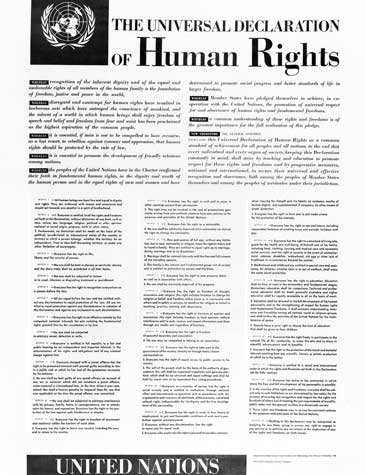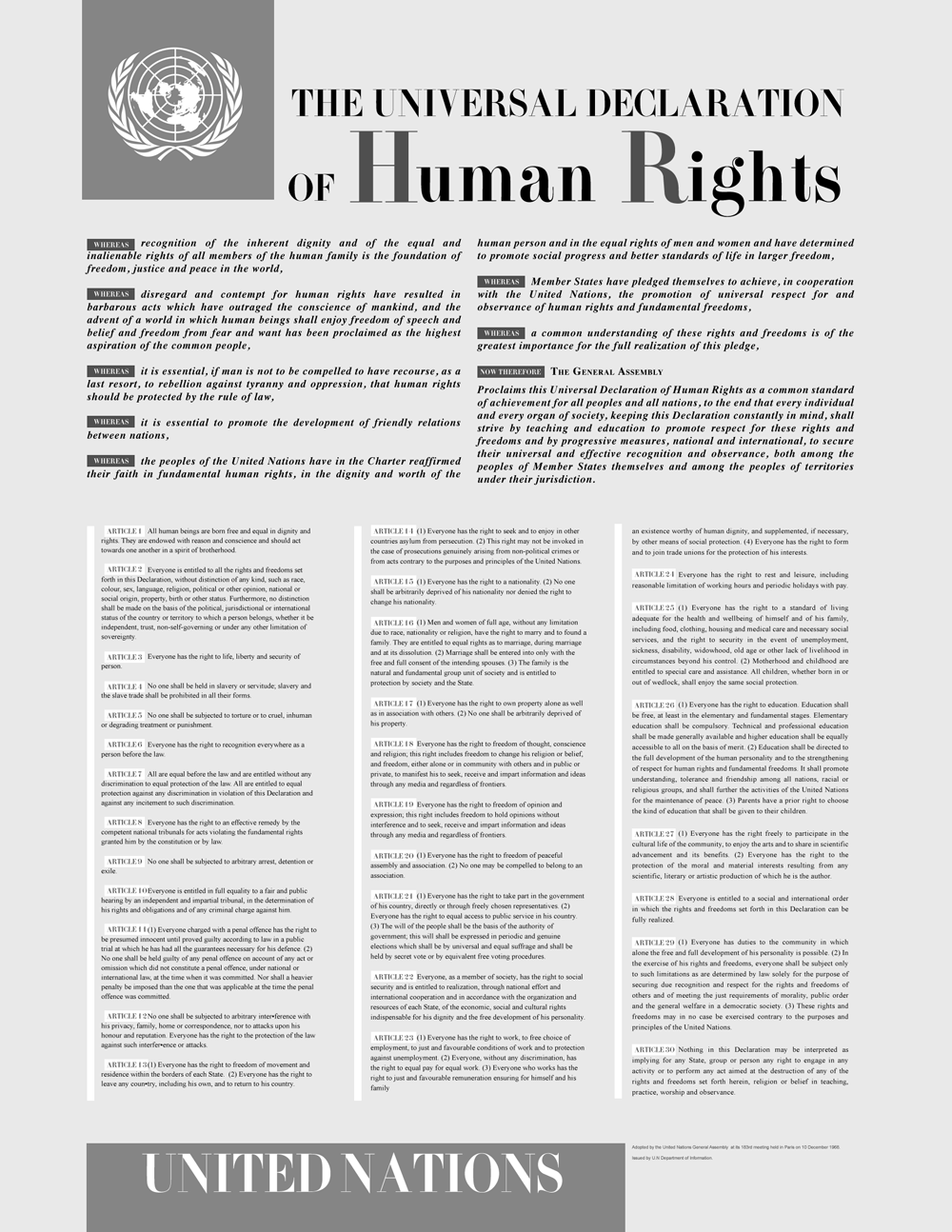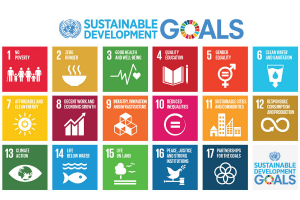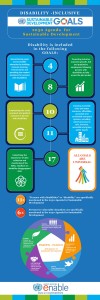++
Universal Declaration of Human Rights
From Wikipedia, the free encyclopedia
Click here to read more at: https://wiki2.org/en/Universal_Declaration_of_Human_Rights
++
Universal Declaration of Human Rights
Click here to read more at: https://www.un.org/en/universal-declaration-human-rights/

The Universal Declaration of Human Rights
The Universal Declaration of Human Rights (UDHR) is a milestone document in the history of human rights. Drafted by representatives with different legal and cultural backgrounds from all regions of the world, the Declaration was proclaimed by the United Nations General Assembly in Paris on 10 December 1948 (General Assembly resolution 217 A) as a common standard of achievements for all peoples and all nations. It sets out, for the first time, fundamental human rights to be universally protected and it has been translated into over 500 languages.
Preamble
Whereas recognition of the inherent dignity and of the equal and inalienable
rights of all members of the human family is the foundation of freedom, justice
and peace in the world,
Whereas disregard and contempt for human rights have resulted in barbarous
acts which have outraged the conscience of mankind, and the advent of a world
in which human beings shall enjoy freedom of speech and belief and freedom
from fear and want has been proclaimed as the highest aspiration of the common
people,
Whereas it is essential, if man is not to be compelled to have recourse, as a last
resort, to rebellion against tyranny and oppression, that human rights should be
protected by the rule of law,
Whereas it is essential to promote the development of friendly relations between
nations,
Whereas the peoples of the United Nations have in the Charter reaffirmed their
faith in fundamental human rights, in the dignity and worth of the human person
and in the equal rights of men and women and have determined to promote
social progress and better standards of life in larger freedom,
Whereas Member States have pledged themselves to achieve, in cooperation
with the United Nations, the promotion of universal respect for and observance of
human rights and fundamental freedoms,
Whereas a common understanding of these rights and freedoms is of the
greatest importance for the full realization of this pledge,
Now, therefore,
The General Assembly,
Proclaims this Universal Declaration of Human Rights as a common standard of
achievement for all peoples and all nations, to the end that every individual and
every organ of society, keeping this Declaration constantly in mind, shall strive by
teaching and education to promote respect for these rights and freedoms and by
progressive measures, national and international, to secure their universal and
effective recognition and observance, both among the peoples of Member States
themselves and among the peoples of territories under their jurisdiction.
Article I
All human beings are born free and equal in dignity and rights. They are
endowed with reason and conscience and should act towards one another in a
spirit of brotherhood.
Article 2
Everyone is entitled to all the rights and freedoms set forth in this Declaration,
without distinction of any kind, such as race, colour, sex, language, religion,
political or other opinion, national or social origin, property, birth or other status.
Furthermore, no distinction shall be made on the basis of the political,
jurisdictional or international status of the country or territory to which a person
belongs, whether it be independent, trust, non-self-governing or under any other
limitation of sovereignty.
Article 3
Everyone has the right to life, liberty and the security of person.
Article 4
No one shall be held in slavery or servitude; slavery and the slave trade shall be
prohibited in all their forms.
Article 5
No one shall be subjected to torture or to cruel, inhuman or degrading treatment
or punishment.
Article 6
Everyone has the right to recognition everywhere as a person before the law.
Article 7
All are equal before the law and are entitled without any discrimination to equal
protection of the law. All are entitled to equal protection against any
discrimination in violation of this Declaration and against any incitement to such
discrimination.
Article 8
Everyone has the right to an effective remedy by the competent national tribunals
for acts violating the fundamental rights granted him by the constitution or by law.
Article 9
No one shall be subjected to arbitrary arrest, detention or exile.
Article 10
Everyone is entitled in full equality to a fair and public hearing by an independent
and impartial tribunal, in the determination of his rights and obligations and of any
criminal charge against him.
Article 11
- Everyone charged with a penal offence has the right to be presumed
innocent until proved guilty according to law in a public trial at which he
has had all the guarantees necessary for his defence. - No one shall be held guilty of any penal offence on account of any act or
omission which did not constitute a penal offence, under national or
international law, at the time when it was committed. Nor shall a heavier
penalty be imposed than the one that was applicable at the time the penal
offence was committed.
Article 12
No one shall be subjected to arbitrary interference with his privacy, family, home
or correspondence, nor to attacks upon his honour and reputation. Everyone has
the right to the protection of the law against such interference or attacks.
Article 13 - Everyone has the right to freedom of movement and residence within the
borders of each State. - Everyone has the right to leave any country, including his own, and to
return to his country.
Article 14 - Everyone has the right to seek and to enjoy in other countries asylum from
persecution. - This right may not be invoked in the case of prosecutions genuinely
arising from non-political crimes or from acts contrary to the purposes and
principles of the United Nations.
Article 15 - Everyone has the right to a nationality.
- No one shall be arbitrarily deprived of his nationality nor denied the right to
change his nationality.
Article 16 - Men and women of full age, without any limitation due to race, nationality
or religion, have the right to marry and to found a family. They are entitled
to equal rights as to marriage, during marriage and at its dissolution. - Marriage shall be entered into only with the free and full consent of the
intending spouses. - The family is the natural and fundamental group unit of society and is
entitled to protection by society and the State.
Article 17 - Everyone has the right to own property alone as well as in association with
others. - No one shall be arbitrarily deprived of his property.
Article 18
Everyone has the right to freedom of thought, conscience and religion; this right
includes freedom to change his religion or belief, and freedom, either alone or in
community with others and in public or private, to manifest his religion or belief in
teaching, practice, worship and observance.
Article 19
Everyone has the right to freedom of opinion and expression; this right includes
freedom to hold opinions without interference and to seek, receive and impart
information and ideas through any media and regardless of frontiers.
Article 20 - Everyone has the right to freedom of peaceful assembly and association.
- No one may be compelled to belong to an association.
Article 21 - Everyone has the right to take part in the government of his country,
directly or through freely chosen representatives. - Everyone has the right to equal access to public service in his country.
- The will of the people shall be the basis of the authority of government;
this will shall be expressed in periodic and genuine elections which shall
be by universal and equal suffrage and shall be held by secret vote or by
equivalent free voting procedures.
Article 22
Everyone, as a member of society, has the right to social security and is entitled
to realization, through national effort and international co-operation and in
accordance with the organization and resources of each State, of the economic,
social and cultural rights indispensable for his dignity and the free development
of his personality.
Article 23 - Everyone has the right to work, to free choice of employment, to just and
favourable conditions of work and to protection against unemployment. - Everyone, without any discrimination, has the right to equal pay for equal
work. - Everyone who works has the right to just and favourable remuneration
ensuring for himself and his family an existence worthy of human dignity,
and supplemented, if necessary, by other means of social protection. - Everyone has the right to form and to join trade unions for the protection of
his interests.
Article 24
Everyone has the right to rest and leisure, including reasonable limitation of
working hours and periodic holidays with pay.
Article 25 - Everyone has the right to a standard of living adequate for the health and
well-being of himself and of his family, including food, clothing, housing
and medical care and necessary social services, and the right to security
in the event of unemployment, sickness, disability, widowhood, old age or
other lack of livelihood in circumstances beyond his control. - Motherhood and childhood are entitled to special care and assistance. All
children, whether born in or out of wedlock, shall enjoy the same social
protection.
Article 26 - Everyone has the right to education. Education shall be free, at least in the
elementary and fundamental stages. Elementary education shall be
compulsory. Technical and professional education shall be made
generally available and higher education shall be equally accessible to all
on the basis of merit. - Education shall be directed to the full development of the human
personality and to the strengthening of respect for human rights and
fundamental freedoms. It shall promote understanding, tolerance and
friendship among all nations, racial or religious groups, and shall further
the activities of the United Nations for the maintenance of peace. - Parents have a prior right to choose the kind of education that shall be
given to their children.
Article 27 - Everyone has the right freely to participate in the cultural life of the
community, to enjoy the arts and to share in scientific advancement and
its benefits. - Everyone has the right to the protection of the moral and material interests
resulting from any scientific, literary or artistic production of which he is the
author.
Article 28
Everyone is entitled to a social and international order in which the rights and
freedoms set forth in this Declaration can be fully realized.
Article 29 - Everyone has duties to the community in which alone the free and full
development of his personality is possible. - In the exercise of his rights and freedoms, everyone shall be subject only
to such limitations as are determined by law solely for the purpose of
securing due recognition and respect for the rights and freedoms of others
and of meeting the just requirements of morality, public order and the
general welfare in a democratic society. - These rights and freedoms may in no case be exercised contrary to the
purposes and principles of the United Nations.
Article 30
Nothing in this Declaration may be interpreted as implying for any State, group or
person any right to engage in any activity or to perform any act aimed at the
destruction of any of the rights and freedoms set forth herein.
++++++++++++++++++
+++

+++++


#Envision2030: 17 goals to transform the world for persons with disabilities
++++
https://www.un.org/development/desa/disabilities/envision2030.html
++++
Imagine the world in 2030, fully inclusive of persons with disabilities
In September 2015, the General Assembly adopted the 2030 Agenda for Sustainable Development that includes 17 Sustainable Development Goals (SDGs). Building on the principle of “leaving no one behind”, the new Agenda emphasizes a holistic approach to achieving sustainable development for all.

The SDGs also explicitly include disability and persons with disabilities 11 times. Disability is referenced in multiple parts of the SDGs, specifically in the parts related to education, growth and employment, inequality, accessibility of human settlements, as well as data collection and the monitoring of the SDGs.
Although, the word “disability” is not cited directly in all goals, the goals are indeed relevant to ensure the inclusion and development of persons with disabilities.
The newly implemented 2030 Agenda for Sustainable Development holds a deep promise for persons with disabilities everywhere.
The year 2016 marks the first year of the implementation of the SDGs. At this critical point, #Envision2030 will work to promote the mainstreaming of disability and the implementation of the SDGs throughout its 15-year lifespan with objectives to:
- Raise awareness of the 2030 Agenda and the achievement of the SDGs for persons with disabilities;
- Promote an active dialogue among stakeholders on the SDGs with a view to create a better world for persons with disabilities; and
- Establish an ongoing live web resource on each SDG and disability.
The campaign invites all interested parties in sharing their vision of the world in 2030 to be inclusive of persons with disabilities.
Please forward your comments, suggestions, references and/or new information on the SDGs and persons with disabilities to enable@un.org or follow us @UNEnable on Facebook and Twitter anduse hashtag #Envision2030 to join the global conversation and help create a world in 2030 that is fully inclusive of persons with disabilities.
The 17 sustainable development goals (SDGs) to transform our world:
GOAL 3: Good Health and Well-being
GOAL 6: Clean Water and Sanitation
GOAL 7: Affordable and Clean Energy
GOAL 8: Decent Work and Economic Growth
GOAL 9: Industry, Innovation and Infrastructure
GOAL 11: Sustainable Cities and Communities
GOAL 12: Responsible Consumption and Production
GOAL 16: Peace and Justice Strong Institutions
GOAL 17: Partnerships to achieve the Goal
Resources:
+++++
Golden Rule
Golden Rule at : From Wikipedia, the free encyclopedia : https://wiki2.org/en/Golden_Rule
The Golden Rule is the principle of treating others as you want to be treated. It is a maxim that is found in many religions and cultures. It can be considered an ethic of reciprocity in some religions, although different religions treat it differently.
The maxim may appear as a positive or negative injunction governing conduct:
- Treat others as you would like others to treat you (positive or directive form)
- Do not treat others in ways that you would not like to be treated (negative or prohibitive form)
- What you wish upon others, you wish upon yourself (empathic or responsive form)
The idea dates at least to the early Confucian times (551–479 BC), according to Rushworth Kidder, who identifies that this concept appears prominently in Buddhism, Christianity, Hinduism, Judaism, Taoism, Zoroastrianism, and “the rest of the world’s major religions”. 143 leaders of the world’s major faiths endorsed the Golden Rule as part of the 1993 “Declaration Toward a Global Ethic”. According to Greg M. Epstein, it is “a concept that essentially no religion misses entirely”, but belief in God is not necessary to endorse it. Simon Blackburn also states that the Golden Rule can be “found in some form in almost every ethical tradition
Read all at : https://wiki2.org/en/Golden_Rule
